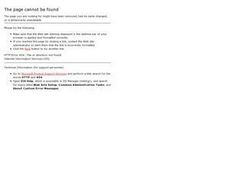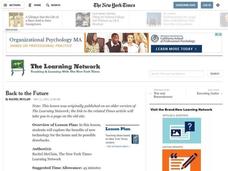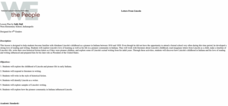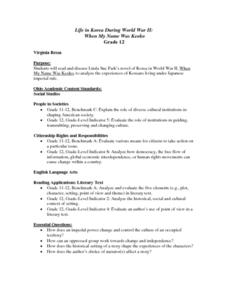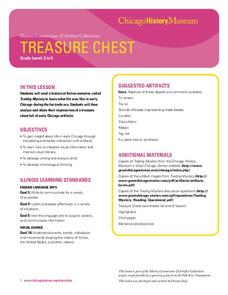Curated OER
Pioneer Values in Willa Cather's My Antonia
Included in this resource are a variety of activities to do while reading Willa Cather's My Antonia. The activities, which range from mapping out Nebraska to writing activities about pioneer living, are all designed with one...
Curated OER
Call It a Hunch
Give young scholars a chance to practice making inferences after reading the book Through My Eyes by Ruby Bridges. They confirm whether or not their conclusions are true, have a class discussion, and then independently complete an...
Curated OER
People Who Make A Difference: American Heroes
Students think about the characteristics of a hero so they can later evaluate which historical figures on the heroes chart meet the criteria.
Curated OER
Making Cloth: The Impact of Technology
Students analyze and discuss several primary source documents that address the changes in technology that affected New England agricultural communities in the early 19th century. They also identify and discuss historical contexts for...
Curated OER
Tracking Down the Real Billy the Kid
Students analyze the role that gunfighters played in the settlement of the West and distinguish between their factual and fictional accounts. Using internet research, students explore the life of Billy the Kid. They write an essay on...
Curated OER
The Russian Revolution
Students explore the Russian Revolution through dramatization. In this Russian Revolution lesson, students participate in drama workshops prior to writing and presenting one-act plays featuring figures of the revolution.
Curated OER
What It Means to Be an American Indian
Students analyze primary source documents and evaluate historical evidence to find consequences of the policies that were adopted from the 1830s to today regarding Native American Indians.
Curated OER
Examining Women's Roles through Primary Sources and Literature
High schoolers interpret historical evidence presented in primary resources. In this women's history instructional activity, students examine the role of women prior to and following the suffrage movement. High schoolers also read...
Scholastic
Perfect Postcards: Illinois
Connect the geography and history of Illinois using an art-centered instructional activity on the railroads. The railroad connected once-distant places, particularly in the Midwest. Using research, class members create postcards of...
Curated OER
Back to the Future
Young scholars explore the benefits of new technology for the home and its possible drawbacks.
Curated OER
An Anecdote is Worth a Thousand Pictures
Students identify anecdotes in speeches and the purposes that politicians use the anecdotes for. They create personal anecdotes for the class to hear, and students decide if the anecdote is real or fabricated.
Curated OER
"Families and Schools of the Past"
First graders listen to and discuss historical fiction and bigraphies from the early American time period. They role-play, draw, write stories and dress up to re-create events from these historical characters.
Curated OER
Letters from Lincoln
Fourth graders explore the childhood of Lincoln and pioneer life in early Indiana. Students respond to literature and write a story using historical fiction. Students explore the writings of President Lincoln and the pioneer community...
Curated OER
Forms Of Knowledge
Students put writing pieces into categories to show different organizational features in writing. In this writing lesson plan, students are shown examples of speeches, poems, editorials, cartoons, parodies, historical fiction, and more.
Curated OER
The People of Kansas
Students investigate primary sources to experience first- hand accounts of Kansas pioneers. They write an historical fiction letter or skit based on territorial documents.
Curated OER
Post Reading Activities for the Novel, "Home Children" by Barbara Haworth-Attard
In this post-reading literature activity worksheet, students examine suggestions for activities to complete after reading Home Children, by Barbara Haworth-Attard. They can choose from 11 activities which include to write diary entries,...
Curated OER
Analyzing and Evaluating Holocaust Literature
Learners examine the history of the Holocaust through literature. Using different pieces of literature, they critique the items in terms of being historical accurate and its value in telling the stories of the Holocaust. They create a...
Curated OER
The Ruins of Pompeii: A Window into History
Sixth graders research the history of Pompeii and its destruction. Locate important geographical features of Rome. Gain insight into the past through archaeological interpretation. Synthesize historical information through imaginative...
Curated OER
Scrapbook of Evidence
Students read three different genres of fiction. They create a story map and brainstorm possible collage inclusions. Each student prepares a minimum of two scrapbook page entries for each text or passage. Students write beside each...
Curated OER
Life in Korea During World War II: When My Name Was Keoko
Twelfth graders review facts about roles of Asia and Japan in World War II, read When My Name Was Keoko to familiarize themselves with daily life and historic events during World War II in Korea, and participate in student-led...
Curated OER
From America, With Love
Students research the experiences of specific immigrant groups in the United States. Letters are written from imaginary immigrants to relatives in their countries of origin, including historically accurate details.
Curated OER
The Holocaust: An Introduction for Children (To Be Used with Number the Stars)
In this literature and history worksheet, students prepare to read the novel by Lois Lowry Number the Stars. Students read the history behind the Nazi occupation of Denmark and the arrest of the Jews there. This is a 10 page historical...
Curated OER
Treasure Chest
Students explore Chicago in the fur-trading era. In this Chicago lesson, students discover what life what like during this time. Students read an historical fiction story about life in the fur-trade era. Students view replicas of...
Curated OER
Fact, Fiction, or Bad Memory
Students identify bias in how the events of the Boston Massacre were reported. They attempt to determine who is to blame for the Boston Massacre by determining the reliability the of sources.
Other popular searches
- Teaching Historical Fiction
- Historical Fiction Time Line
- Historical Fiction Grade 3
- Writing Historical Fiction
- Reading Historical Fiction
- Historical Fiction Passages
- Historical Fiction Timeline
- Historical Fiction Reports
- Historical Fiction Apollo 13
- Historical Fiction European
- Fact in Historical Fiction
- Historical Fiction Genres






